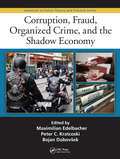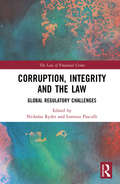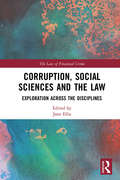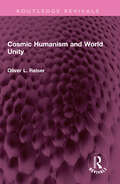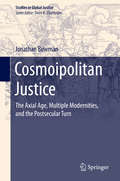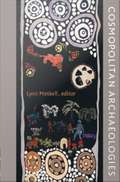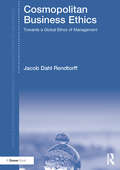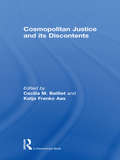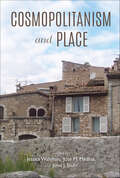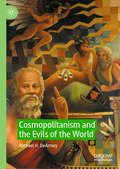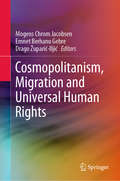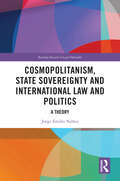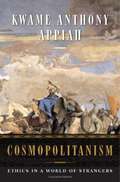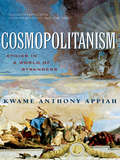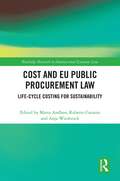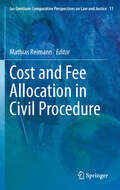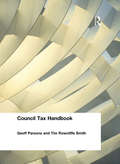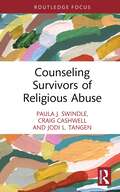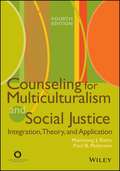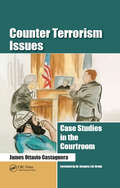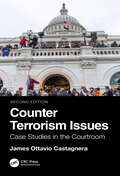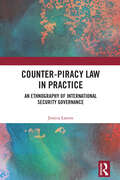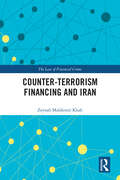- Table View
- List View
Corruption, Fraud, Organized Crime, and the Shadow Economy (Advances in Police Theory and Practice)
by Peter C. Kratcoski Maximilian Edelbacher Bojan DobovšekFueled by corruption, fraud, and organized crime, the shadow economy also known as the informal, black market, illegal, or underground economy is currently on the rise worldwide. Corruption, Fraud, Organized Crime, and the Shadow Economy addresses shadow economies and the players involved by examining various aspects of criminal law and prosecution
Corruption, Integrity and the Law: Global Regulatory Challenges (The Law of Financial Crime)
by Nicholas Ryder Lorenzo PasculliGlobalisation has opened new avenues to corruption. Corrupt practices are proliferating not only within national borders but across different countries. Despite many national and international anti-corruption bodies and strategies, corruption far from being eradicated. There is an urgent global demand for a better understanding of corruption as a phenomenon and a thorough assessment of the existing regulatory remedies, towards the establishment of more effective (and possibly uniform) anti-corruption measures. Our previous collection, Corruption in the Global Era (Routledge, 2019), analysed the causes, the sources, and the forms of manifestation of global corruption. An ideal continuation of that volume, this book moves from the analysis of the phenomenon of corruption to that of the regulatory remedies against corruption and for the promotion of integrity. Corruption, Integrity and the Law provides a unique interdisciplinary assessment of the global anti-corruption legal framework. The collection gathers top experts in different fields of both the academic and the professional world – including criminal law, EU law, international law, competition law, corporate law and ethics. It analyses legal instruments adopted not only at a supranational level but also by different countries, in the attempt of establishing an interdisciplinary and comparative dialogue between theory and practice and between different legal systems towards a better global promotion of integrity. This book will be of value to researchers, academics and students in the fields of law, criminology, sociology, economics, ethics as well as professionals – especially solicitors, barristers, businessmen and public servants.
Corruption, Social Sciences and the Law: Exploration across the disciplines (The Law of Financial Crime)
by Jane EllisThe problem of corruption, however described, dates back thousands of years. Professionals working in areas such as development studies, economics and political studies, were the first to most actively analyse and publish on the topic of corruption and its negative impacts on economies, societies and politics. There was, at that time, minimal literature available on corruption and the law. The literature and discussion on bribery and corruption, as well as on the negative impact of each and what is required to address them, particularly in the legal context, are now considerable. Corruption and anti-corruption are multifaceted and multi-disciplinary. The focus now on the law and compliance, and perhaps commercial incentives, is relatively easy. However, corruption, anti-corruption and the motivations for them are complex. If we continue to discuss, debate, engage, address corruption and anti-corruption in our own disciplinary silos, we are unlikely to significantly progress the fight against corruption. What do terms such as 'culture of integrity', 'demand accountability', ‘transparency and accountability’ and ‘ethical corporate culture’ dominating the anti-corruption discourse mean, if anything, in other disciplines? If they are meaningless, what approach would practitioners in those other disciplines suggest be adopted to address corruption. What has their experience been in the field? How can the work of each discipline contribute to the work of whole and, as such, improve our work in and understanding of anti-corruption? This book seeks to answer these questions and to understand the phenomenon more comprehensively. It will be of value to researchers, academics, lawyers, legislators and students in the fields of law, anthropology, sociology, international affairs, and business.
Cosmic Humanism and World Unity (Routledge Revivals)
by Oliver L. ReiserFirst published in 1975 Cosmic Humanism and World Unity presents a comprehensive overview of the world view, a theory of knowledge, a cosmology and a possible universal religion termed as cosmic humanism. It aims to discover and formulate some of the main principles that may help mankind integrate the world ethically, aesthetically, and spiritually, as science and technology have integrated the planet in its physical relationships. It discusses themes like mental pattern for the planet; language and world order; grand strategy of evolution; Helium Psychosphere; cosmic humanism and the "space age"; and existentialist cosmology and harmony. This is an interesting read for scholars and researchers of philosophy.
Cosmoipolitan Justice: The Axial Age, Multiple Modernities, and the Postsecular Turn (Studies in Global Justice #15)
by Jonathan BowmanThis book assesses the rapid transformation of the political agency of religious groups within transnational civil society under the conditions of globalization that have weakened the sovereign nation-state. It offers a comprehensive synthesis of the parallel resurgences of Jasper's axial thesis from the distinct lines of research initiated by Eisenstadt, Habermas, Taylor, Bellah, and others. It explores the concept of cosmoipolitanism from the combined perspectives of sociology of religion, critical theory, secularization theory, and evolutionary cultural anthropology. At the theoretical level, cosmoipolitanism prescribes how local, national, transnational, global, and virtual spaces ought publically to engage in transcivilizational discourse without presuming secular assumptions tied to cosmopolitanism. As a transnational extension of the moral-ethical universality of the great Axial Age traditions, cosmoipolitanism provides an ideal description of empirical data. Employing the insights of critical theory, this book offers a micro-level analysis of the pragmatics of discourse of each of the major axial traditions producing a genealogy in iterated stages of the dialectics of secularization as a multi-faceted narrative of the role of religion in alternative modernities. While circumscribing the particular historical limits of each tradition, the book extends their internal claims to species universality in light of the potential for boundless communication Jaspers saw as initiated with the Axial Age. In Jon Bowman's novel and important work, he rethinks the challenges of global justice. Bowman is not just concerned with global justice in the modern world, but with a genealogy that begins with a better understanding of the Axial age, one that is also the unique signature of cosmoi-political institutions. Arguing with depth and precision, Bowman challenges Kantian and Rawlsian universalism. His argument provides a new interpretation of cosmopolitan justice as he explores the deeper roots of cosmopolitan justice. James Bohman Saint Louis University Jon Bowman's Cosmoipolitan Justice is an important, innovative and timely work. Construing globality in terms of pervasive conditions of worldwide interdependence, Bowman advances a decidedly pluralistic account of cosmopolitanism, one uniquely shaped by recent theories of multiple modernities. His analysis is sustained by a highly informed appropriation of such diverse thinkers as Theodor Adorno, Abudullah An-Naim, Talad Asad, Schmuel Eisenstadt, Jürgen Habermas, Karl Jaspers, John Rawls, Amartya Sen, and Charles Taylor. One special feature is the book's synthesis of research on global governance with that on post-secularity and the place of religion in the public sphere. On this basis Bowman presents a distinctive account of the world's axial religions, one underwriting a multi-polar, intercultural global public realm able to address social, political, and economic issues confronting the global community today. This book should be of great interest to students and scholars in philosophy, political theory, international relations, sociology, and religious studies. Professor Andrew Buchwalter Department of Philosophy University of North Florida
Cosmopolitan Archaeologies
by Lynn MeskellAn important collection, Cosmopolitan Archaeologies delves into the politics of contemporary archaeology in an increasingly complex international environment. The contributors explore the implications of applying the cosmopolitan ideals of obligation to others and respect for cultural difference to archaeological practice, showing that those ethics increasingly demand the rethinking of research agendas. While cosmopolitan archaeologies must be practiced in contextually specific ways, what unites and defines them is archaeologists' acceptance of responsibility for the repercussions of their projects, as well as their undertaking of heritage practices attentive to the concerns of the living communities with whom they work. These concerns may require archaeologists to address the impact of war, the political and economic depredations of past regimes, the livelihoods of those living near archaeological sites, or the incursions of transnational companies and institutions. The contributors describe various forms of cosmopolitan engagement involving sites that span the globe. They take up the links between conservation, natural heritage and ecology movements, and the ways that local heritage politics are constructed through international discourses and regulations. They are attentive to how communities near heritage sites are affected by archaeological fieldwork and findings, and to the complex interactions that local communities and national bodies have with international sponsors and universities, conservation agencies, development organizations, and NGOs. Whether discussing the toll of efforts to preserve biodiversity on South Africans living near Kruger National Park, the ways that UNESCO's global heritage project universalizes the ethic of preservation, or the Open Declaration on Cultural Heritage at Risk that the Archaeological Institute of America sent to the U. S. government before the Iraq invasion, the contributors provide nuanced assessments of the ethical implications of the discursive production, consumption, and governing of other people's pasts. Contributors. O. Hugo Benavides, Lisa Breglia, Denis Byrne, Chip Colwell-Chanthaphonh, Alfredo Gonzlez-Ruibal, Ian Hodder, Ian Lilley, Jane Lydon, Lynn Meskell, Sandra Arnold Scham
Cosmopolitan Business Ethics: Towards a Global Ethos of Management (Finance, Governance and Sustainability)
by Jacob Dahl RendtorffIn Cosmopolitan Business Ethics: Towards a Global Ethos of Management, Jacob Dahl Rendtorff maps the concept of global business ethics, related to sustainability and corporate governance, via an examination of the major theories of business ethics and the philosophy of management. The book is based on the philosophy of Immanuel Kant and the European tradition, which is applied as the foundation for the analysis of the contemporary European and Anglo-American debate on business ethics in order to formulate an up-to-date theory of global business ethics. The book will compare the different schools of business ethics, corporate citizenship, and the philosophy of management and will address the modern-day issues of sustainability, business and human rights, corporate social responsibility, stakeholder management, and corporate governance, offering insights on how to deal with these international challenges of global economics, the development and protection of human rights, and the environment. This book proposes a decision-making model for cosmopolitan business ethics as the foundation of management and leadership in dealing with the complexities of globalization. The case studies will address the efforts of businesses to work with global and cosmopolitan business ethics at the levels of maintaining corporate integrity. Both the theoretical argument and case studies presented in the book are based on exchanges with notable business ethicists, philosophers of management, business managers, and public policy-makers.
Cosmopolitan Justice and its Discontents
by Cecilia M. Bailliet Katja Franko AasCosmopolitan Justice and its Discontents pursues a reflection upon the institutional orders designed to ensure respect for the rule of law, human rights, and social justice. The majority of literature on cosmopolitanism tends to be oriented in sociology, political science or philosophy, and is largely positive. This book aims to fill the lacuna with respect to critical and legal perspectives in this field. In particular, it highlights the importance of international economic law and its institutions when evaluating the evolution of cosmopolitan norms. In addition, it provides critical and multidisciplinary perspectives on Cosmopolitan Justice and Sovereignty; Institutions, Civil Society and Accountability; and Social Exclusion, Migration, and Global Markets. This book will be of considerable interest to academics and students concerned with international public and private law, international criminal law, international economic law, human rights, migration, criminology, political science, and philosophy.
Cosmopolitanism and Place (American Philosophy)
by Jessica Wahman, José M. Medina, and John J. StuhrAddressing perspectives about who "we" are, the importance of place and home, and the many differences that still separate individuals, this volume reimagines cosmopolitanism in light of our differences, including the different places we all inhabit and the many places where we do not feel at home. Beginning with the two-part recognition that the world is a smaller place and that it is indeed many worlds, Cosmopolitanism and Place critically explores what it means to assert that all people are citizens of the world, everywhere in the world, as well as persons bounded by a universal and shared morality.
Cosmopolitanism and the Evils of the World
by Michael H. DeArmeyThis book analyses five forms of transnational evils and offers cosmopolitan recommendations for reducing their occurrence. With civilisation in crisis it is crucial, now more than ever, to attempt to mitigate the catastrophes that face us in the decades to come. In a compelling and frightening account of transnational evil, DeArmey identifies and explores in depth the dark side of human behaviour, from genocide, slavery, torture and terrorism, to the greatest disaster of our time: the worldwide destruction of the earth’s biosphere. Building on Kant’s theory of a new world organisation designed to eliminate the evil of war and strengthen the world community, DeArmey develops a biotic and value-based theory of dignity, reconstructing a cosmopolitan world order that supports the Kantian theories of respect, care and hospitality. Cosmopolitan changes to the United Nations are proposed, including a bicameral assembly and, crucially, an environmental council with legal powers. In each chapter, cosmopolitan recommendations are made that will reduce the occurrence of the transnational evil in question; it is through these recommendations that the dignity and world citizenship of humanity can be protected and strengthened. Without them, we are headed towards the collapse of civilisation and mass extinction in the biosphere.
Cosmopolitanism in Context
by Roland Pierik Wouter WernerIs it possible and desirable to translate the basic principles underlying cosmopolitanism as a moral standard into effective global institutions. Will the ideals of inclusiveness and equal moral concern for all survive the marriage between cosmopolitanism and institutional power? What are the effects of such bureaucratisation of cosmopolitan ideals? This volume examines the strained relationship between cosmopolitanism as a moral standard and the legal institutions in which cosmopolitan norms and principles are to be implemented. Five areas of global concern are analysed: environmental protection, economic regulation, peace and security, the fight against international crimes and migration.
Cosmopolitanism, Migration and Universal Human Rights
by Mogens Chrom Jacobsen Emnet Berhanu Gebre Drago Župarić-IljićThis book describes the potential and challenges of cosmopolitanism from a philosophical and historical point of view. Through the prism of cosmopolitanism, this book considers how the recent surge in migration is affecting our current reality, while also taking stock of the contemporary potential of cosmopolitan ideas. It considers and compares the significance of religion and culture for the wider societal acceptance or rejection of refugees. Moreover, the book examines the European Court of Human Rights jurisprudence on immigration policies, non-refoulement, humanitarian law and gender. It presents empirically based research of a quantitative, qualitative and comparative nature regarding the determinants of attitudes towards cosmopolitanism and more generally concerning public opinion on migration issues, and reflects on conceptions of and attitudes towards citizenship, while also imagining new forms of citizenship. This book serves as a comprehensive overview and resource for migration scholars from the social sciences and the humanities, as well as students and other stakeholders in the fields of migration and human rights.
Cosmopolitanism, State Sovereignty and International Law and Politics: A Theory (Routledge Research in Legal Philosophy)
by Jorge E. NúñezThis book assesses the relationship between cosmopolitanism and sovereignty. Often considered to be incompatible, it is argued here that the two concepts are in many ways interrelated and to some extent rely on one another. By introducing a novel theory, the work presents a detailed philosophical analysis to illustrate how these notions might theoretically and practically work together. This theoretical inquiry is balanced with detailed empirical discussion highlighting how the concepts are related in practice and to expose the weaknesses of stricter interpretations of sovereignty which present it as exclusionary. Finally, the book looks at territorial disputes to explore how sovereignty and cosmopolitanism can successfully operate together to deal with global issues. The work will be of interest to academics and researchers in the areas of Legal Philosophy, Legal Theory and Jurisprudence, Public International Law, International Relations and Political Science.
Cosmopolitanism: Ethics in a World of Strangers
by Kwame Anthony AppiahFrom Publishers Weekly In a world more interconnected than ever, the responsibilities and obligations we share remain matters of volatile debate. Weighing in on a discourse that includes both visions of "clashing civilizations" and often equally misguided cultural relativism, Ghana-born Princeton philosopher Appiah (In My Father's House) reclaims a tradition of creative exchange and imaginative engagement across lines of difference. This cosmopolitan ethic, which he traces from the Greek Cynics and through to the U.N.'s Universal Declaration of Human Rights, must inevitably balance universals with respect for particulars. This balance comes through "conversation," a term Appiah uses literally and metaphorically to signal the depth of encounters across national, religious and other forms of identity. At the same time, Appiah stresses conversation needn't involve consensus, since living together mostly entails just getting used to one another. Amid the good and bad of globalization, the author parses some basic cultural-philosophical beliefs-drawing frequent examples from his own far-flung multicultural family as well as from impersonal relationships of exchange and power-to focus due attention on widespread and unexamined assumptions about identity, difference and morality. A stimulating read, leavened by cheerful, fluid prose, the book will challenge fashionable theories of irreconcilable divides with a practical and pragmatic worldview that revels in difference and the adventure of a shared humanity. This is an excellent start to Norton's new Issues of Our Time series. (Jan.) Copyright © Reed Business Information
Cosmopolitanism: Ethics in a World of Strangers (Issues of Our Time) (Issues of Our Time #0)
by Kwame Anthony Appiah"A brilliant and humane philosophy for our confused age."--Samantha Power, author of A Problem from Hell Drawing on a broad range of disciplines, including history, literature, and philosophy--as well as the author's own experience of life on three continents--?Cosmopolitanism? is a moral manifesto for a planet we share with more than six billion strangers.
Cost and EU Public Procurement Law: Life-Cycle Costing for Sustainability (Routledge Research in International Economic Law)
by Anja Wiesbrock Marta Andhov Roberto CarantaPublic institutions, companies and governments in the EU and around the world are increasingly engaging in sustainable public procurement – a broad concept that must consider the three pillars of economic equality, social welfare and public health and environmental responsibility when designing public tenders and finalizing government contracts. This book contributes to the development of life-cycle criteria tools and methodologies for public procurement in the EU. It collects both sector-crossing contributions analysing the most relevant theoretical and legal aspects, including both EU law and contract theory, and sector-specific contributions relating to some of the most important sustainable goods and services markets. The book starts with a chapter that discusses the different approaches to including sustainability considerations in buying decisions by both private and public purchasers, and then goes on to examine the EU law on LCC and how it is implemented in different Member States. These chapters address the challenges in balancing economic and sustainability objectives under EU internal market law. One chapter develops the analysis with specific reference to public-private partnership. Another chapter elaborates how multi-stakeholders’ cooperation is necessary to develop LCC, based on a case study of a lighting services procurement. Three sector-specific studies relating to social housing, textile and clothing and IT close the book. With contributors from a range of backgrounds including law, business, management, engineering and policy development, this interdisciplinary book provides the first comprehensive study on LCC within the framework of EU public procurement law.
Cost and Fee Allocation in Civil Procedure: A Comparative Study (Ius Gentium: Comparative Perspectives on Law and Justice #11)
by Mathias ReimannThe volume describes and analyzes how the costs of litigation in civil procedure are distributed in key countries around the world. It compares the various approaches, draws general conclusions from that comparison, and presents global trends as well as common problems and solutions. In particular, the book deals with three principal questions: First, who pays for civil litigation costs, i.e., to what extent do losers have to make winners whole? Second, how much money is at stake, i.e., how expensive is civil litigation in the respective jurisdictions? And third, whose money is ultimately spent, i.e., how are civil litigation costs distributed through mechanisms like legal aid, litigation insurance, collective actions, and success oriented fees? Inter alia, the study reveals a general trend towards deregulation of lawyer fees as well as a substantial correlation between the burden of litigation costs and membership of a jurisdiction in the civil and common law families. This study is the result of the XVIIIth World Congress of Comparative Law held under the auspices of the International Academy of Comparative Law.
Costs in Arbitration Proceedings (Dispute Resolution Guides)
by Michael O'ReillyThis revised text provides a practical guide to the law relating to all aspects of costs in arbitration proceedings. The Arbitration Act 1996, has made significant changes to the law on arbitration costs. These have, among other things, made arbitrators responsible for the cost-effective management of cases, and given them new powers to help them achieve this. In its second edition, "Costs in Arbitration Proceedings" has been updated to include sections on: agreements as to costs; the arbitrator's power to limit costs; and forms and precedents. It sets out the law of costs for the parties and of the parties, the arbitrators' fees, taxation of costs, and security for costs, costs implications of offers of settlement and application to the court in repect of costs. It is suitable for professional arbitration lawyers and also for the new or lay arbitrator.
Council Tax Handbook
by Tim Smith Geoff ParsonsEG Council Tax Handbook is a timely publication. The text is easy to understand and very comprehensive. This volume helps to define the council tax in various contexts.
Counseling Survivors of Religious Abuse (Routledge Focus on Religion)
by Craig Cashwell Paula J. Swindle Jodi L. TangenThis book identifies and analyzes the forms, causes, and potential treatments of religious abuse. Religious abuse can include experiences of sexual, physical, emotional, spiritual, and mental abuse connected to a religious context. The book will help readers understand different types of religious abuse, including where the perpetrator is a religious leader, a group, or a system, as well as when there is an overtly spiritual element connected to the justification for the abuse. It also describes common experiences of those who have experienced religious abuse and some treatment approaches that will be useful to mental health providers when their clients present with these experiences. The rigorous scholarly approach of this book provides an academically grounded insight into this complex topic. As such, it will be a key reference for those studying and working in Religious Studies, Religion and Psychology, the Sociology of Religion, and Counseling and Mental Health.
Counseling for Multiculturalism and Social Justice: Integration, Theory, and Application (4th Edition)
by Paul Pedersen Manivong J. RattsIn this book, Drs. Ratts and Pedersen combine the very best from the multicultural and social justice traditions into a new paradigm, which will guide counselors toward a deeper understanding of the connections between these two counseling forces. Significantly updated and expanded from the previous edition, this fourth edition focuses on applying multiculturalism and social justice in various clinical settings with diverse client populations.
Counter Terrorism Issues: Case Studies in the Courtroom
by James Ottavio CastagneraThe American legal profession and judicial system bear a unique responsibility to set and maintain the balance between defending homeland security and protecting the civil liberties outlined in the Bill of Rights. These competing interests will continue to collide as the threats to our safety grow. Exploring the most significant terrorist cases of
Counter Terrorism Issues: Case Studies in the Courtroom
by James Ottavio CastagneraCounter Terrorism Issues: Case Studies in the Courtroom, Second Edition presents a panoramic view of the American judiciary’s handling of domestic terrorism in the last 30 years. As has played out in recent history, the American legal profession and judicial system bear a unique responsibility to set and maintain the balance between defending homeland security and protecting the civil liberties outlined in the Bill of Rights. These competing interests will continue to collide as the threats to our safety grow.The book examines some of the most notorious cases—the two attacks on the World Trade Center, the Oklahoma City bombing, and the Fort Hood massacre. Updates from the First Edition include a reflection on the Boston Marathon bombing, as well as an examination of the events of January 6, 2021, the subsequent legal proceedings and convictions of those involved in the assault on the U.S. Capitol, and the danger arising from increased domestic extremism and violent rhetoric from the right.Drawing extensively upon trial transcripts, witness statements, and judicial opinions, the book reviews the events and cases to demonstrate how the criminal justice system has grappled with conflicting facts and countervailing legal rights and responsibilities. Through the words of witnesses, judges, and the attorneys who tried these cases in America’s courtrooms, coverage provides important commentary on the historical/political contexts of these events, enabling readers to understand the significance of these infamous attacks on U.S. soil.
Counter-Piracy Law in Practice: An Ethnography of International Security Governance
by Jessica LarsenThis book is a socio-legal study of counter-piracy. It takes as its case the law enforcement efforts after 2008 to suppress piracy off the coast of Somalia. Through ethnographic fieldwork, the book invites the reader onto a Danish warship patrolling the western Indian Ocean for piracy incidents and into the courtroom in Seychelles, where more than 150 suspects were prosecuted. The aim is to understand how counter-piracy worked in practice. The book uses assemblage theory to approach law as a social process and places emphasis on studying empirical enforcement practices over analysing legal provisions. This supplements existing scholarship on the legal aspects of counter-piracy. Scholarship has mainly examined applicable law governing counter-piracy. This book steps into the field to examine applied law. Its methodology renders visible areas of legal ambiguity and identifies practices that suggest impunity and question legal certainty. It thus contributes with new policy-relevant knowledge for international security governance. The relevance is one of urgency. Counter-piracy off Somalia has served as a governance paradigm, which is replicated in other maritime domains. Consideration of the implications for policy is therefore needed. The book will be of interest to policy-makers, security practitioners and scholars who share a methodological commitment to practice.
Counter-Terrorism Financing and Iran (The Law of Financial Crime)
by Zeynab Malakouti KhahThis book blends doctrinal and empirical research to examine the phenomenon of counter-terrorism financing at the level of both international and Iranian national law. The work discusses the legitimacy, fairness and effectiveness of the international counter-terrorism financing framework, and then examines to what extent Iran has implemented it. The main focuses of the book are on the criminalisation of terrorism financing; financial regulations as preventive measures applied to the sectors at risk of terrorism financing, including the formal financial system, the informal financial system and the non-profit organisations; and the international and unilateral sanctions imposed on individuals and entities who support terrorist acts, terrorists and terrorist organisations. Given that terrorism and terrorism financing are socio-legal, political and economic phenomena in nature, the book approaches the problem of terrorism financing from an interdisciplinary perspective, exploring the relationship between the characteristics of Iran as a state recognised for supporting non-state militant actors (NSMAs), some of which are designated as terrorist by some countries. Empirical research includes documentary fieldwork in Iran, with the collection of original and primary materials that have not previously been analysed. The book also adopts a policy transfer approach, using the rules and regulations of the United Kingdom. Presenting a non-Western perspective on counter-terrorism financing, the book will be essential reading for students, researchers and policy-makers working in the area of financial crime.
